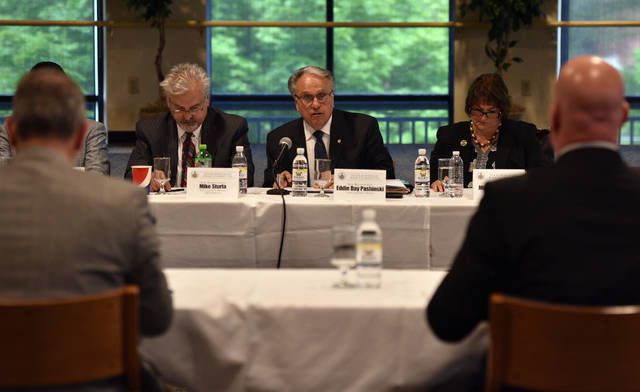Click here to subscribe today or Login.
WILKES-BARRE — At Monday’s House Democratic Policy Committee hearing on the possibility of enacting a severance tax on the Marcellus shale industry, facts and opinions abounded and much of it was eye-opening.
State Rep. Eddie Day Pashinski hosted hearing with several of his legislative colleagues to discuss the impacts of implementing a potential Marcellus Shale severance tax in Pennsylvania. Pashinski, D-Wilkes-Barre, held the hearing at the Wilkes University Henry Student Center Ballroom on West South Street.
Among those in attendance, was state Rep. Mike Sturla, chairman of the House Democratic Policy Committee. Offering testimony were Secretary Dennis Davin, Pennsylvania Department of Community and Economic Development; Scott Perry, deputy secretary for Oil and Gas, Pennsylvania Department of Environmental Protection; Marleen Troy, associate professor of environmental engineering at Wilkes University; and Marc Stier, director, Pennsylvania Budget and Policy Center.
Stier testified that a severance tax would bring in substantial new revenues to the state on a recurring basis. He said even at the current relatively low natural gas prices, a modest tax would bring in $200 million to $300 million per year.
“And that amount is expected to double or triple over the next few years as natural gas prices rise,” Stier said.
Pashinski favors enacting a 6.5 percent tax, with the money going into the state’s general fund to be used for education, reducing property taxes and more.
“We need to re-establish this discussion on making the gas industry pay its fair share,” Pashinski said.
Stier said all other states that have substantial natural resources have taxed them with some kind of special tax above and beyond the normal business or corporate profit taxes.
That’s true when state governments have been run by Democrats or Republicans, liberals or conservatives, progressives or reactionaries, Stier said.
Stier then asked, “So why then is Pennsylvania the outlier?”
Stier said he thinks the answer can only be one thing — the entrepreneurial energy of Pennsylvanians who have seen an opportunity in blocking a severance tax and taken it.
“And I don’t mean the entrepreneurial energy of natural gas producers who, as we have seen, are willing to pay the tax,” Stier testified. “I mean the entrepreneurial energy of politicians who have seen an opportunity to secure over $9 million in campaign contributions, not just from those producers, but from organizations that oppose taxation and government in general, in return for blocking a severance tax in our state.”
Stier said the problem has been that revenues have declined faster than expenditures. He said the state’s budget deficit is a product of reductions in revenues rather than an expansion in state spending.
Stier said the basic elements of the investment deficit are broadly known:
• Pennsylvania continues to have the most unequally funded public schools in the country.
• The state is fourth from the bottom of all states in spending on higher education and 35th in the percentage of adults with college degrees.
• Pennsylvania is near the top of the list of states with the most structurally deficient bridges.
• And the state spends about a one-third on the Department of Environmental Protection compared to 2008, despite the greater burden placed on the department by the growth of natural gas fracking.
Stier said given both the budget and investment deficits, Pennsylvania must secure new recurring revenues.
“Yet, at a time when wages are stagnant, it should not do so by increasing taxes on working people and the middle class,” Stier said. “Instead it should turn to taxes that fall more on businesses and people outside the state.”
Stier said the severance tax continues to be good public policy for Pennsylvania, just as it was when first proposed years ago.
“Indeed, in light of our recurring budget problems, it is should be a matter of both astonishment and regret that we have not put in place such a tax years ago,” he said.
Davin also testified that he favors enactment of a fair severance tax.
“Currently, Pennsylvania is at the epicenter of an energy revolution,” Davin said. “We can shape our own destiny by ensuring that our natural resources are taxed fairly and appropriately, and used to support Keystone job creation and growth, accomplished through in-state use and/or manufacture of the natural gas and natural gas liquids.”
Davin said he doesn’t want Pennsylvania to miss out on the opportunity to receive the full benefits of a globally relevant and economically prosperous shale play that is taking place within our borders.
“We can do that with a fair severance tax,” he said.
Frank Joanlanne, president of Borton-Lawson Engineering, testified that “singling out” the gas industry for higher taxes would be “ill-timed and counter-productive.” He said the state’s impact fee has generated more than $1 billion in revenue to local governments and statewide programs.
“I must emphasize all 67 counties benefit from this impact fee,” Joanlanne said.
Joanlanne said Luzerne County has received $1.4 million directly and more than $7 million in Commonwealth Financing Authority projects — all funded by the Marcellus Legacy Fund.
“No other industry that I am aware of has made those kinds of contributions in the commonwealth,” he said. “Prosperity through taxation simply does not work.”





